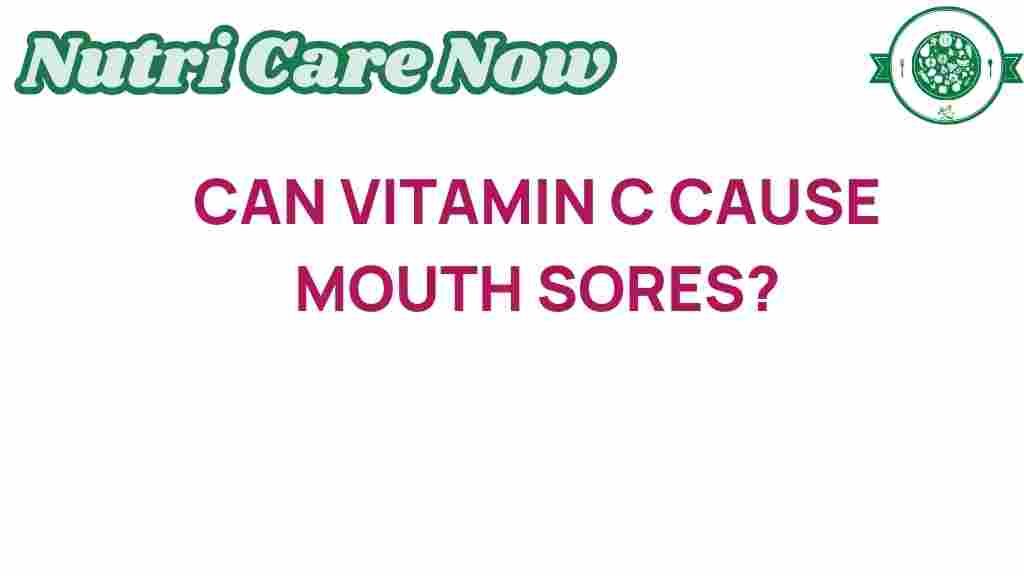Unveiling the Truth: Can Vitamin C Really Cause Mouth Sores?
Vitamin C is known for its numerous health benefits, particularly in supporting the immune system and enhancing skin health. However, there has been a long-standing debate about whether high doses of Vitamin C can lead to mouth sores. In this article, we will explore the relationship between Vitamin C and mouth sores, examine how this vitamin affects oral health, and provide insights into proper nutrition and dietary supplements. By the end of this article, you’ll understand the truth behind Vitamin C and mouth sores, enabling you to make informed decisions for your health.
The Role of Vitamin C in Health and Nutrition
Vitamin C, also known as ascorbic acid, is a vital nutrient that plays several crucial roles in the body:
- Immune System Support: Vitamin C is essential for the immune system, helping to protect against infections and illnesses.
- Antioxidant Properties: It acts as a powerful antioxidant, combating oxidative stress and protecting cells from damage.
- Collagen Production: Vitamin C is vital for the synthesis of collagen, which is necessary for healthy skin and connective tissues.
- Absorption of Iron: It enhances the absorption of non-heme iron from plant-based foods, preventing anemia.
Considering these benefits, it’s no wonder that Vitamin C is a popular choice in dietary supplements and skincare products. However, some individuals report experiencing mouth sores after taking high doses of Vitamin C. Let’s delve deeper into this potential connection.
Understanding Mouth Sores
Mouth sores, also known as aphthous ulcers, are painful lesions that can appear inside the mouth, on the gums, or on the tongue. They can disrupt daily activities, including eating, speaking, and brushing teeth. Common causes of mouth sores include:
- Stress
- Hormonal changes
- Nutritional deficiencies (especially Vitamin B12, iron, and folic acid)
- Food sensitivities (such as citrus or spicy foods)
- Infections
- Allergic reactions
The Connection Between Vitamin C and Mouth Sores
Vitamin C is essential for maintaining oral health, but there are some nuances to consider. Here are some key points regarding its potential link to mouth sores:
- High Doses: While normal dietary intake of Vitamin C is beneficial, excessive supplementation (often exceeding 2000 mg per day) may lead to gastrointestinal discomfort and, in some cases, mouth sores.
- Allergic Reactions: Some individuals may have an allergic reaction to Vitamin C supplements, which can manifest as mouth sores or other symptoms.
- Acidic Nature: Vitamin C is acidic, and some people may experience mouth irritation or sores when consuming high amounts of acidic foods or supplements.
Step-by-Step Process: How to Use Vitamin C Safely
To enjoy the benefits of Vitamin C while minimizing the risk of mouth sores, follow these steps:
- Consult Your Healthcare Provider: Before starting any new supplement regimen, especially high doses, consult with a healthcare professional to determine your specific needs.
- Start with Food Sources: Incorporate natural sources of Vitamin C into your diet, such as fruits (oranges, strawberries, kiwi) and vegetables (bell peppers, broccoli, spinach).
- Choose the Right Supplement: If you opt for supplements, choose a reputable brand and start with a low dose, gradually increasing as needed.
- Monitor Your Body’s Response: Pay attention to how your body reacts after introducing Vitamin C. If you notice mouth sores or irritation, consider reducing the dosage or switching to food sources.
- Stay Hydrated: Drink plenty of water to help flush out excess Vitamin C and maintain oral health.
Troubleshooting Tips for Managing Mouth Sores
If you experience mouth sores while taking Vitamin C, here are some tips to manage them:
- Avoid Irritants: Stay away from spicy, acidic, or crunchy foods that may worsen the pain.
- Use Topical Treatments: Over-the-counter topical gels or ointments can provide relief and promote healing.
- Maintain Oral Hygiene: Continue to brush and floss gently to prevent infection and promote healing.
- Consider Dietary Adjustments: If certain foods trigger mouth sores, keep a food diary to identify and eliminate them from your diet.
- Consult a Dentist: If mouth sores persist, seek advice from a dental professional to rule out underlying issues.
Vitamin C in Skincare
Aside from oral health, Vitamin C is a popular ingredient in skincare products due to its ability to:
- Brighten skin tone
- Reduce signs of aging
- Improve skin texture
- Protect against UV damage
When applying Vitamin C topically, it’s essential to choose products with stable formulations to maximize benefits. Always conduct a patch test to ensure no adverse reactions occur.
Conclusion
In conclusion, Vitamin C is a crucial nutrient for overall health, immune support, and skin health. While the connection between Vitamin C and mouth sores is not entirely clear, excessive intake may lead to discomfort for some individuals. By following proper guidelines for Vitamin C supplementation and being mindful of your body’s responses, you can reap the benefits of this vital vitamin without the unwanted side effects.
If you suspect that Vitamin C is causing mouth sores or if you have any concerns about your health and nutrition, please consult with a healthcare professional for personalized advice.
For more information on maintaining oral health and nutrition, you can check out this comprehensive resource.
To learn more about Vitamin C and its benefits, visit this informative article.
This article is in the category Health and created by NutriCareNow Team
